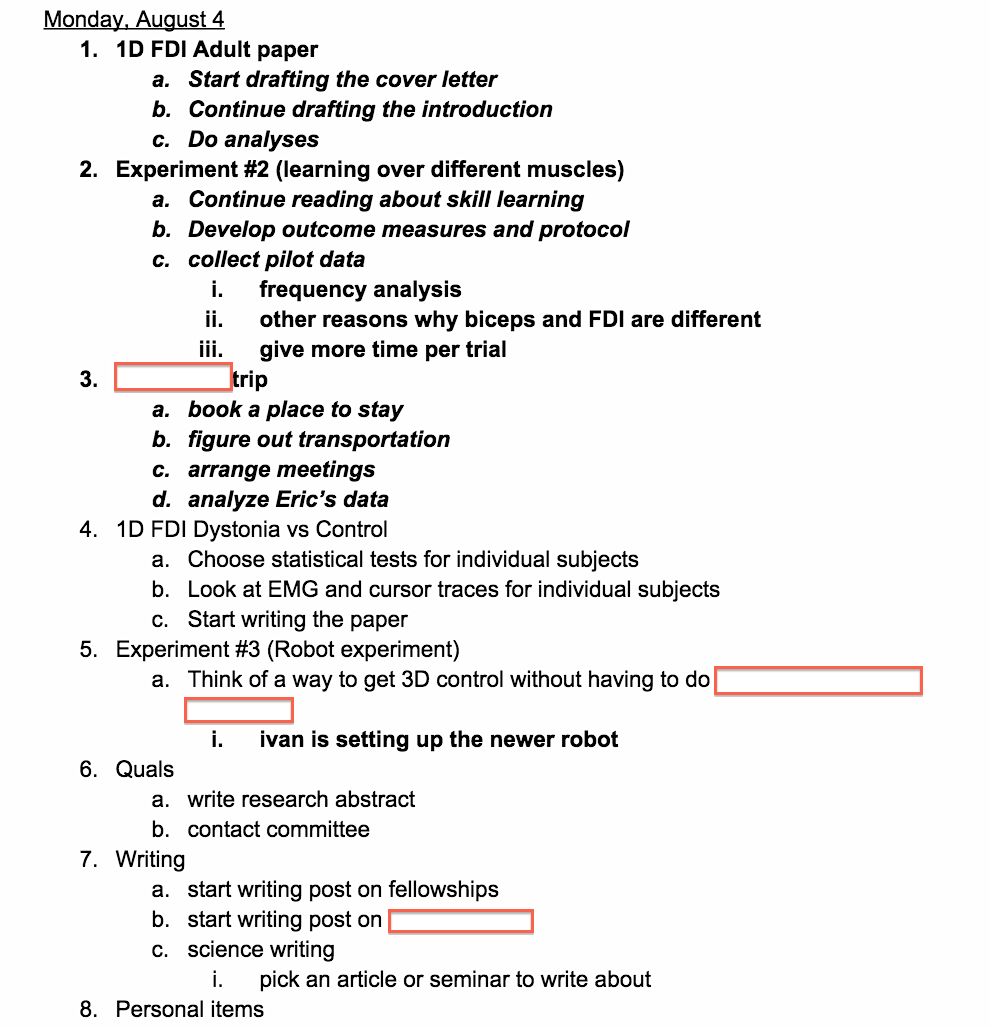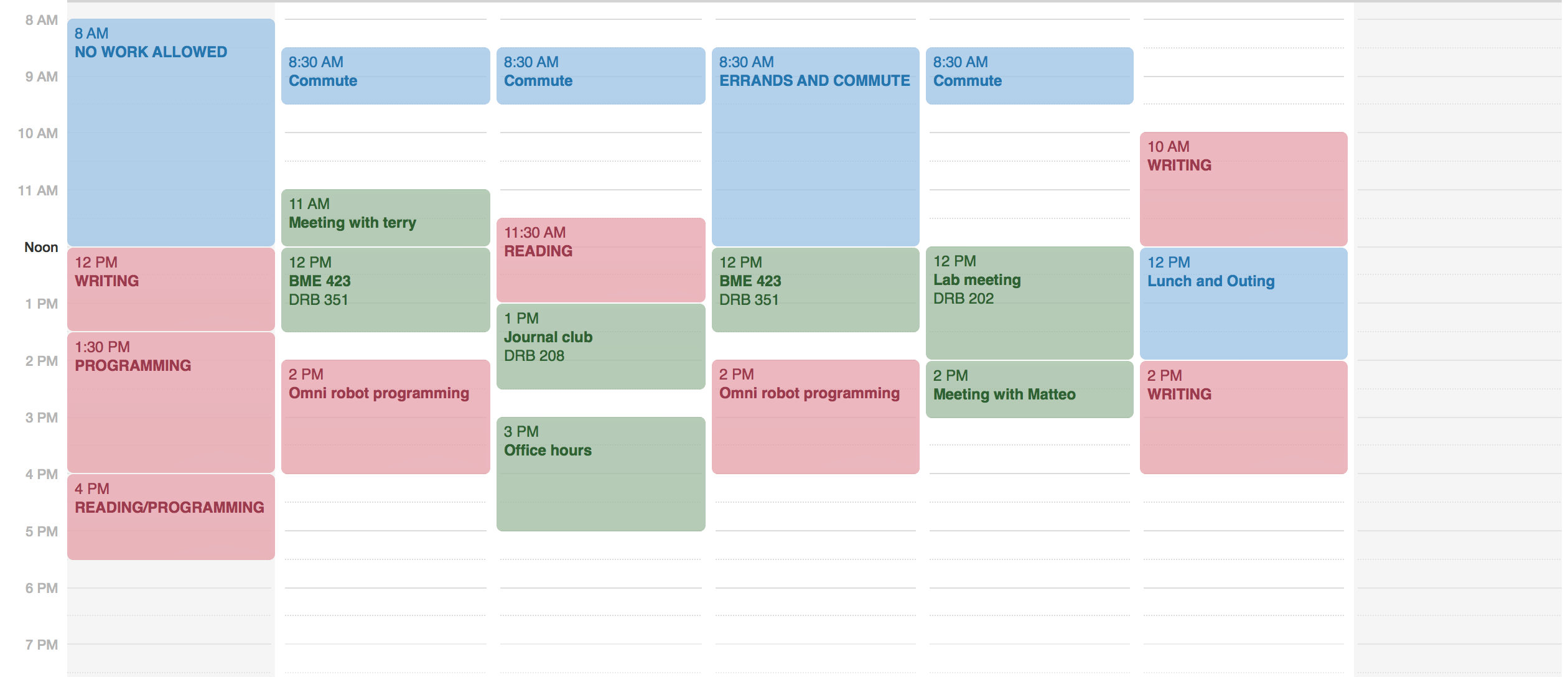People Plan, and Life Laughs
The title of my post is the politically-correct version of an old Yiddish saying: “Der mentsh trakht un Got lakht”, “man plans and God laughs”. We should probably remember to laugh too, because life’s too serious as it is!
Whenever you read posts about how people manage to be productive, they usually turn out to be written by people who are extremely disciplined, whether by nature or by training. For example, I once read this article. I know that people other people like him (such as my wife!) who can schedule down to the minute and execute it, but I have a great deal of trouble relating to their advice. Discipline, sticking to schedules, and estimating how long tasks take have never been my strong suit. While I have generally found the practice of scheduling my activities (be they professional or personal) a very useful practice, at least for now I’m not capable of running as tight a ship as he does, and I don’t think being so disciplined is a requirement for success in life. Success comes from playing to your personal strengths and finding ways to compensate for your weaknesses. My strength is being flexible without being entirely structure-less, but for me, too much structure leads to important things falling by the wayside.
I think everyone, myself included, can inculcate more discipline into their life, and benefit thereby. If it doesn’t come naturally to you, how do you ensure you are doing your utmost to accomplish?
“Schedule” has a baby sister, and her name is “List”. The thing that keeps me going is having my List that I update every week. I hesitate to call it a “to-do list” partially because of how much that term makes people cringe, but also because it doesn’t only contain tasks. On my List is everything I need to accomplish, and everything I desire. There is no need to simplify on “the List”; if anything, I use it to get every detail I care about down on paper. And with the advent of The Cloud, I’ve found it useful to copy-and-paste the current version of my list and only update the copy. Being able to trace the progression of tasks allows you backtrack and see when things were accomplished, if necessary. And any time you’re feeling blue, you can look back to the beginning and see how many things you have accomplished and the turns your life has taken. Thanks, by the way, to Laura Shum (@lauracshum) for that nugget of wisdom!
I tend to organize my List like an outline. For example, I will usually have a number of headers for work-related things-to-do. So each experiment will get a header, and sub-tasks will have one indents, details will have two indents, etc. Here’s a recent example:
This is an old List, and even though it was a month and a half ago, bears little resemblance to the things I’m up to right now. Looking at it and seeing how much things have changed in a scant six weeks inspires me to keep pushing.
At the bottom, you can see there’s a header for “personal items”. For obvious reasons, I didn’t include that part of my List in this post; it’s personal! But I can tell you that some of the things include: build exercise into my week; practice piano; set times to socialize. These are all things that, when I schedule them and do them only at the scheduled times, life is better all around.
There is no way to have a realistic discussion of scheduling without touching on the issues of work-life balance. Most people in the world, even if they love their work, desire and pursue a life more complex than work-eat-sleep. There will be elements of life that cannot fit into a rigid schedule, the most obvious of these is family. No matter what makes you feel loved, whether it’s getting attention or having tasks-to-do taken off your plate, it takes time, and can’t always fit a schedule. And kids! New babies demand attention entirely impulsively, so you might have to be prepared to throw rigid scheduling out the window. Even when they get older, they are still emotionally dependent on you, so you can’t always wave a schedule in their faces. But if you provide your life (and their lives) with zero structure, you’re essentially being productive when you feel like it, and that’s not a recipe for success.
There are always some things that you can plan on doing on a weekly basis. I tend to find that with my List and a weekly template in hand, you can do a lot to identify reasonable work hours, fit in the things you want to do, and plan time to relax. Here’s an example:
The things on my template for the semester in green are non-negotiable except for emergencies. Red are work tasks; they need to happen but are the easiest to move around. Blue are personal, and I’ll be more willing to shift around the red than the blue usually. As you can see, there are LOTS of holes in the schedule. Those holes have to be filled in on a weekly basis. It allows me to account for what’s going on in life, what tasks need priority, and who needs my attention. It allows be to factor in the need to rest the mind and the need to socialize without losing track of productivity.
At the end of the day, you have to be clear with yourself from the outset that schedules are merely a game plan, and life will play jokes on your plans. And when life plays jokes on you, just say “Oh, silly you!” and start rearranging your puzzle pieces. Life, productivity, family, planning, it’s all one big game, really. Even the best batters only hit the ball 30% of the time. All we can really do is our best, and that has to be enough.



